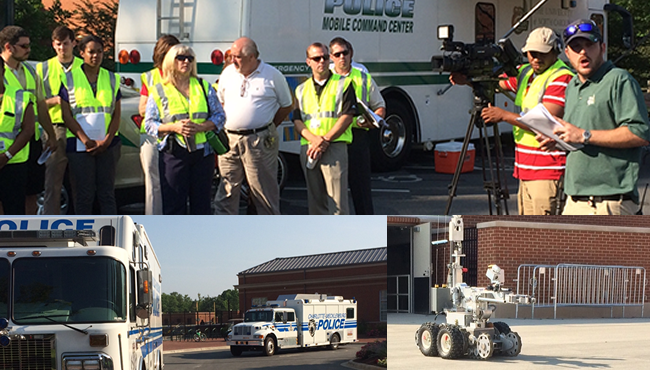
Training is essential to the University’s efforts to maintain a safe and secure campus. Recently, UNC Charlotte held an emergency response simulation at Jerry Richardson Stadium, in conjunction with City of Charlotte and Mecklenburg County agencies.
Personnel from UNC Charlotte’s Police and Public Safety and Business Continuity Departments conducted the simulation along the football stadium concourse near Mac Everett Way. Charlotte Fire Department; Charlotte-Mecklenburg Police Department (CMPD) Bomb Squad; Alcohol, Tobacco and Firearms (ATF) Canine Unit; Mecklenburg County Medic; and the FBI participated in the simulation of a bomb threat.
More than 30 University staff members from the risk management safety and security, venue management, athletics, environmental health and safety and University communications participated in the four- hour exercise, led by Director of Business Continuity and Emergency Management Planning Chris Gonyar, Business Continuity Analyst Shawn Kiley and PPS Chief Jeff Baker,
The focus of the simulation involved a “bomb threat” during the second quarter of a football game in which the stadium is filled with nearly 15,000 spectators. As part of the simulation, a suspicious-looking duffle bag, located near one of the stadium entrances, is spotted.
Exercise participants discussed how the stadium would be evacuated and the CRI campus would be on lock-down. The ATF bomb-detecting canine unit confirmed that the backpack contained unknown explosive materials for the simulation, and a CMPD bomb squad robot, equipped with water cannon, was dispatched to determine more details about the bomb. CMPD simulated the disabling of the device and the arrest of a suspect.
 “The exercise went well,” noted Gonyar. “It is really exciting to see UNC Charlotte and our external partners come together and practice responding to an event we hope we never have to face. What we observed at the exercise is only a fraction of the hard work and effort that goes on behind the scenes to make this campus as safe as possible.”
“The exercise went well,” noted Gonyar. “It is really exciting to see UNC Charlotte and our external partners come together and practice responding to an event we hope we never have to face. What we observed at the exercise is only a fraction of the hard work and effort that goes on behind the scenes to make this campus as safe as possible.”
UNC Charlotte employs highly trained professionals dedicated to ensuring a secure environment for students, faculty, staff and visitors, Gonyar stated, adding the University regularly practices emergency response with external city and county partners through table-top drills and live-action simulations.
A number of media outlets covered the Aug. 6 simulation, including WBTV 3, WSOC TV 9, NBC Charlotte 36, Time Warner News 14 and WCCB Charlotte 18.
Notable UNC Charlotte safety and security initiatives
- UNC Charlotte was the first UNC institution to establish a Campus Safety and Security Committee; it includes staff, faculty, undergraduate and graduate student representation. Chancellor Philip L. Dubois proactively created the committee in 2008
- The committee methodically reviews, evaluates and recommends measures and investments to enhance safety and security and compiles an annual Campus Safety and Security Report
- UNC Charlotte Police and Public Safety (PPS) have two professionally trained sex crimes detectives on its force.
- Sexual assault response training to ensure compliance with Title IX has been a mandatory aspect of in-service training for PPS officers since 2013.
- UNC Charlotte PPS introduced the “Live Safe” mobile app for use by students (2014)
- PPS manages a robust community-oriented policing strategy that includes multiple outreach campaigns throughout the academic year
- PPS has an assigned, dedicated Clery Act officer to ensure compliance; the first such role in the UNC system (2014)
- The University assembled a peer Clery review team to evaluate data reflecting the current Clery Report (2012) and also purchased and implemented SunGard OSSI software for managing service calls; this software is designed for Clery reporting (2012)
- PPS is seeking prestigious accreditation from the Commission on Accreditation for Law Enforcement
- PPS collaborates with the Charlotte-Mecklenburg Police Department, meeting monthly and interacting frequently
- PPS investigative squad maintains a matrix of sex crimes reported to them, including reports from other law enforcement agencies
- The University holds an annual student-led Campus Safety Walk, which includes campus police and other leaders, to identify potential safety and security gaps on the campus; participants recommend measures to improve any gaps detected (Established before 2006)
- PPS officers are cross-trained to provide Special Weapons and Tactics (SWAT) capabilities (Since 2011)
- The University established the Collegiate Recovery Community within the Center for Wellness Promotion to provide 12-step programming and other resources for students recovering from addictive disorders. The program is the first of its kind in UNC system (2012)
- The Center for Wellness Promotion and the Department of Police and Public Safety provide training in the prevention of and response to sexual assault.
- The University hired a full-time Title IX coordinator to provide oversight, guidance and education on matters related to sexual harassment and sexual violence
- All campus police officers are trained in responding to sexual assaults
- On-campus crime has decreased by 29 percent since 2010
For more information about safety and security at UNC Charlotte, visit the business continuity website.